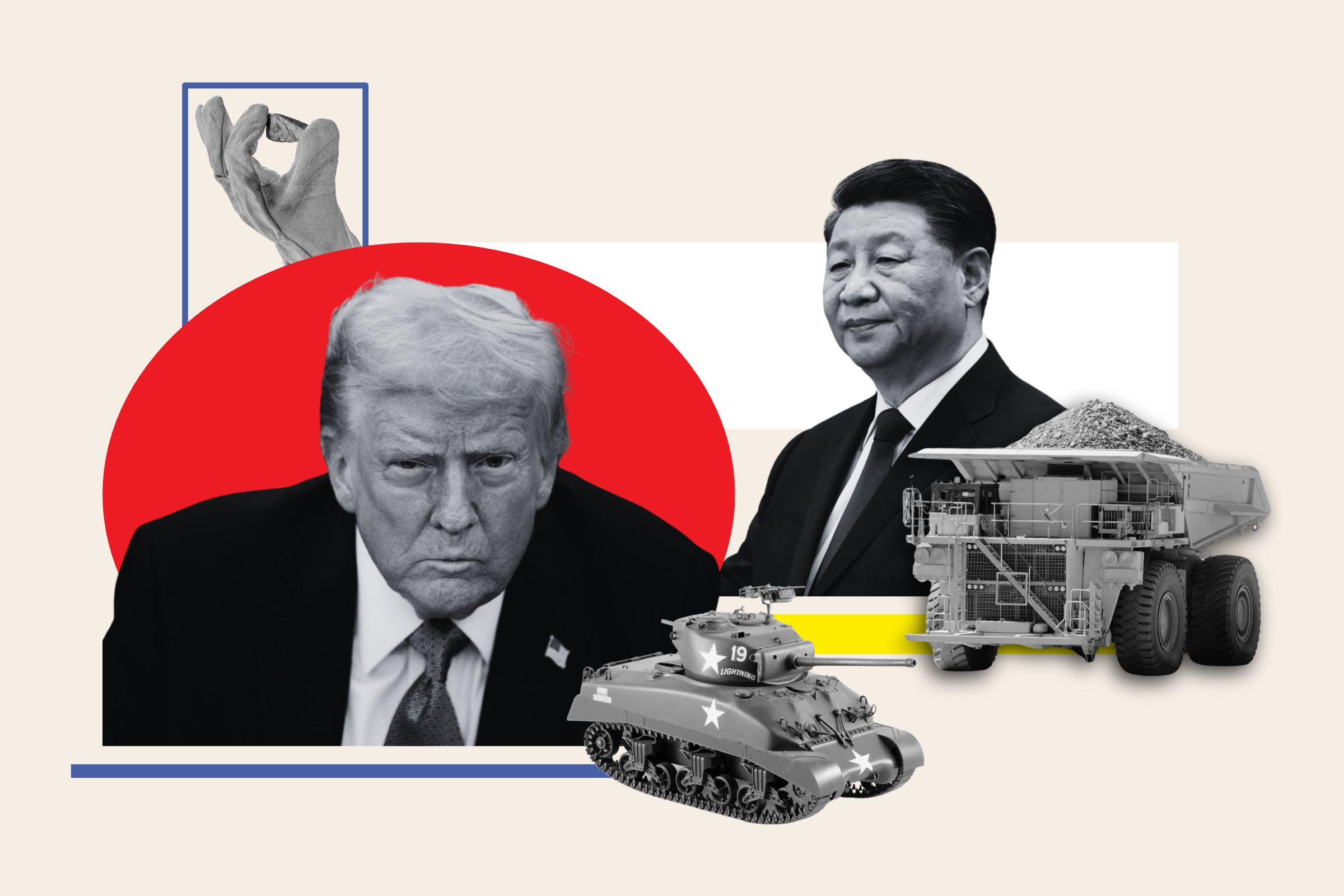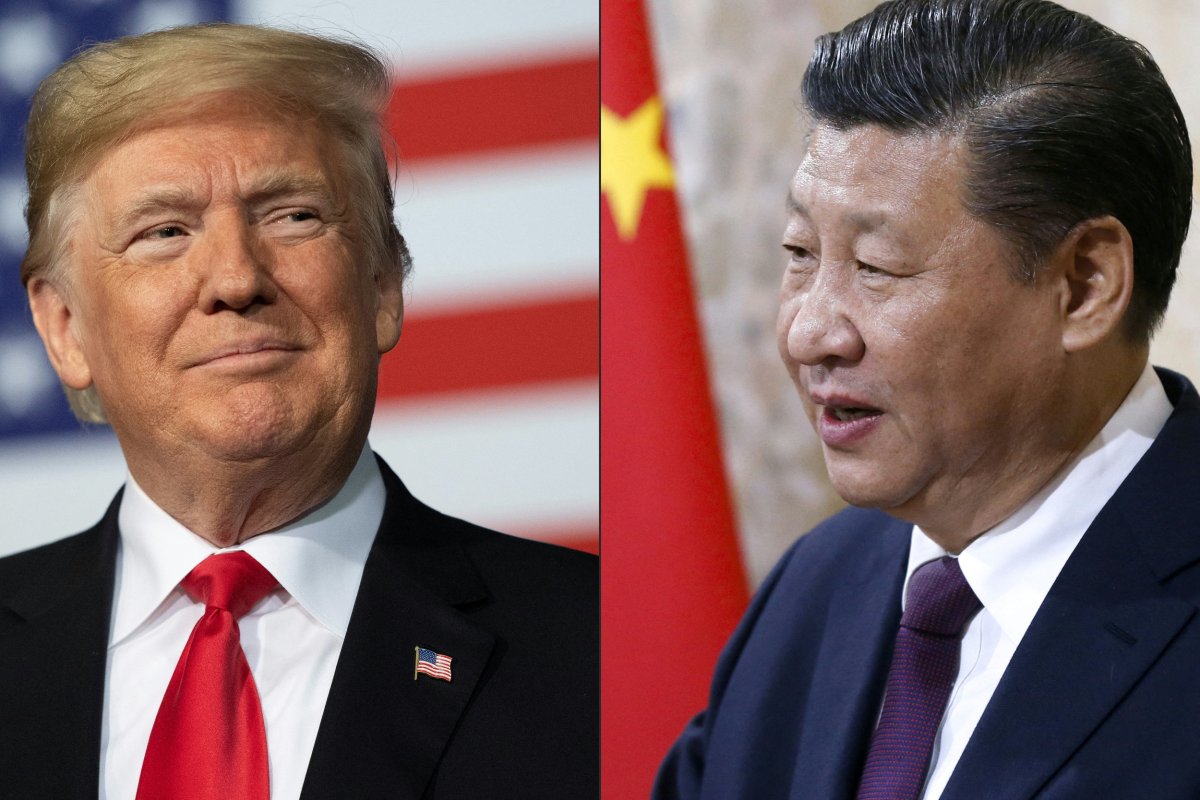
President Donald Trump knows his hike in tariffs for China’s goods to 145 percent will up the ante in a trade war, but Beijing also holds a strong hand with its control of the materials critical for the United States defense industry.
China first responded on April 3 to Trump’s initial salvo of 54 percent levies on its exports by placing export restrictions on rare earth elements, which are key for the fighter aircraft that will form the backbone of the U.S. Air Force’s next-generation fleet.
Following a deal with Boeing, Trump has touted the F-47 as the successor to the F-22 Raptor. But the viability of the U.S. Next Generation Air Dominance (NGAD) program depends heavily on the materials China produces.
They include seven categories of medium and heavy rare earths, including samarium, gadolinium, terbium, dysprosium, lutetium, scandium and yttrium.
Photo Illustration by Newsweek/Getty Images
“They are definitely arrows in their quiver of how China can respond to these ever increasing tariffs,” said Tom Brady, professor of practice at the Colorado School of Mines.
“Dysprosium is critical for use in high temperature magnets,” he told Newsweek. “Jet engines and things like that need high temperature magnets that keep that magnetic quality at very high temperatures.”
Yttrium is required for high-temperature jet engine coatings, high-frequency radar systems and precision lasers. It also allows thermal barrier coatings on turbine blades to stop aircraft engines from melting mid-flight.
China’s Export Controls
These minerals are needed for high-performance magnets and actuators. Metals like titanium, tungsten, and niobium are also essential for structural strength, heat resistance, and stealth coatings.
“China’s export controls on key medium and heavy rare earth elements pose significant risks to US national security, defense manufacturing, and high-tech industries,” said Jamie Underwood from the SFA-Oxford consultancy in a press release on April 5.
He noted how the elements on China’s list are needed for high-performance permanent magnets for advanced missile systems and directed energy weapons.
They are relied on by more than just the defense industry; they underpin the creation of computer chips and electric cars. China’s move means it can restrict export licenses it issues, giving it a weapon equal to those made from the minerals it controls, which it has wielded before.
In 2010, China halted rare-earth exports to Japan following tensions between the countries following a boat collision in disputed waters near the Senkaku islands. In July 2023, China restricted exports of gallium and germanium, used in chips, radars, and satellites, in what was seen as a response to American restrictions on technology sales and transfers.
Gallium is crucial for semiconductors and microchips for defense and consumer electronics, advanced radar, communication systems, artificial intelligence (AI) and satellite and space technology.
“This situation in the world is probably about 15 years in the making,” said Harvey Kaye, executive director of US Critical Materials, which has confirmed at its Sheep Creek site in Montana the highest-grade deposits of rare earths and gallium.
“Suddenly critical minerals, rare earths are a geopolitical weapon, and it’s serious,” he told Newsweek.
He said the U.S. is paying the price today for allowing China to steal a march on developing and processing critical minerals. Although there were promising deposits in the United States, China flooded the market, dropping prices and lulling companies into purchasing Chinese minerals.
Dominant in producing heavy rare earths, China also controls most of its mining within the country and in Myanmar.
“The Chinese, in terms of the Belt and Road Initiative utilized the processing thereof and the supply as a geopolitical tool,” Kaye said, referring to China’s long-term global infrastructure strategy adopted in 2013. The grip China also has on processing minerals outside the country has created “a critical situation here in the United States.”

Getty Images
“Make America Critically Mineral Independent Again.”
The White House exempted critical minerals from its tariffs. However, China’s move to curb access to its minerals has focused minds on the potential within the U.S. to make up the shortfall domestically.
On March 20, Trump signed an executive order that he said would boost American mineral production, streamline permitting and enhance national security in coordination with the National Energy Dominance Council.
According to the order, the Defense Production Act would also be used to expand domestic mineral production capacity. The order said 70 percent of U.S. rare earths come from China but also noted that Iran and Russia control large mineral deposits.
Kaye said the Trump administration’s move will help the push for critical mineral and rare earth sovereignty for the defense of the homeland.
“To use some of the current administration words, you could say ‘make America critically mineral independent again,'” he said.
The Sheep Creek site his firm is involved with is on a list of federal lands that contain critical mineral resources, which has been provided to the secretary of the Interior. The firm says measured gallium grades there range from 180 to 385 parts per million—far above the 50 ppm that the U.S. had been importing primarily from China.
“Our goal is to stand on the steps of Congress and deliver a bag of processed or separated rare earths and gallium to the government by the first quarter of 2026,” Kaye said.
However, there is concern about the impact of Trump’s latest actions on the quest to increase American production of rare earth elements away from its sole site at California’s Mountain Pass Rare Earth Mine.
Uncertain investment climate
This is because his increase of tariffs on China to 125 percent while announcing a pause on additional levies for other countries adds to short-term uncertainty for potential investors in projects that are long-term in their execution.
“What kind of serious investor is going to put up big dollars for that with this much uncertainty,” said Brady.
“You can’t just do an investment like that with an executive order that just can be rescinded when the next Democratic administration comes into play,” he said.
He believes a legislative process through Congress is needed to give more certainty to the long lead-in time required to build and operate a facility that produces high-quality refined metals and alloys for defense and consumer applications.
“It is going to take many years for that to happen,” he said. “It’s just not like a light switch—it’s going to take years to develop, to get those processes dialed in and optimized.”
